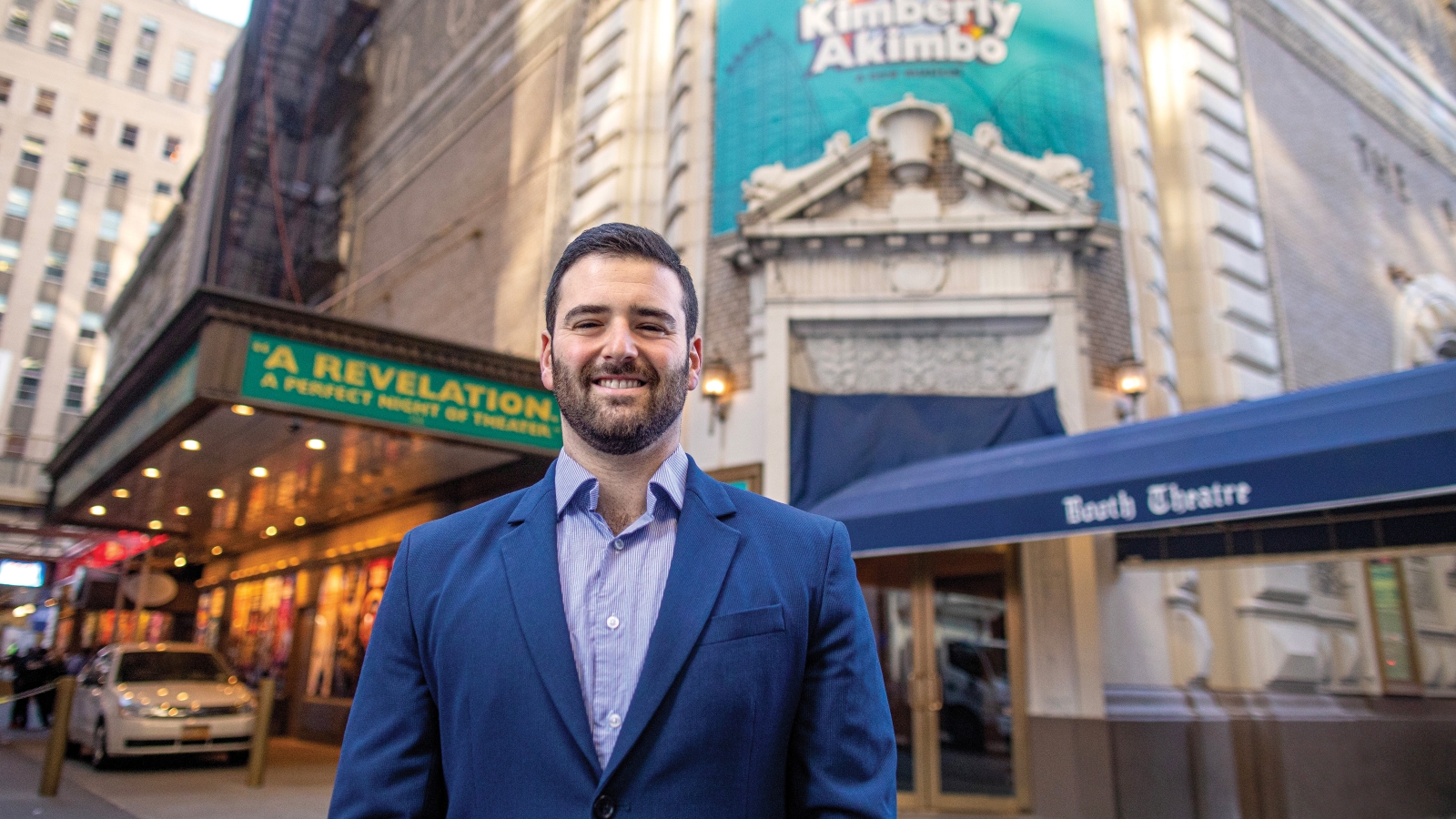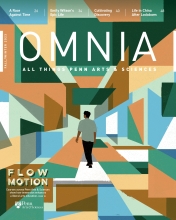From the Clubhouse to the Tonys
Commercial theater producer Tim Bloom, C’17, reflects on the art of making people laugh and the chance opportunities that shaped his path from Penn’s premier musical comedy troupe to Broadway.

Of his aspirations at Penn, Tim Bloom, C’17, recalls, “I thought I was going to be a theater nerd who worked in politics, but I ended up being a political nerd who works in the theater.” During his first week on campus, he followed an impulse to apply for a position on the business staff of the musical comedy troupe Mask and Wig. Eventually becoming the group’s chairman, he sensed his career interests shifting from politics to entertainment.
Through a RealArts @ Penn internship the summer after his junior year, Bloom gained perspective and made connections with Penn alums that launched him into commercial theater production. As an associate to acclaimed producer David Stone, C’88, Bloom has assisted with productions including Wicked, Topdog/Underdog, and Kimberly Akimbo—winner of the 2023 Tony Award for Best Musical. Here, he reflects on the art of making people laugh and his journey from Penn to Broadway.
Have you always liked theater?
I enjoyed musical theater at summer camp and in high school, but I wasn’t a theater person until Penn. I tagged along to the interviews for the business staff of Mask and Wig because one of my Quad hallmates was doing it. Mask and Wig became an important part of my Penn experience; without it, I wouldn’t have ended up where I am now.
How did your career interests shift during your time at Penn?
I was a double major in political science and ancient history. Electoral politics are my hobby, and I follow them closely. But as I became a more senior member of Mask and Wig, I decided to pursue entertainment. I was dead set on moving to the West Coast to do film and TV.
Junior year, I got an internship in Los Angeles through RealArts @ Penn. It was very exciting. I worked for a couple of Penn alums at Management 360, now called Entertainment 360. While there, I connected with Alison Greenspan, C’94, who worked at Di Novi Pictures; she gave me a second job that summer and became a great mentor. But as an East Coaster, I was surprisingly homesick.
After graduation the first job I got in New York in entertainment was in theater. My college roommate and fellow theater producer, Ryan Solomon, ENG’17, introduced me to David Stone. Staying in the musical comedy lane, Mask and Wig’s bread and butter, helped me figure out that theater wasn’t just a path to what I want to do; it actually is what I want to do.
What does being a theater producer entail?
A producer is the CEO of a theater company. Every commercially produced show is, at its heart, a small business. Producing in theater is seldom a full-time job; many theater producers have another source of income to keep them afloat. When you have a really successful show, you can do it full time.
At Stone Productions, I work as a producing associate. I’m lucky that my day job is in producing while I strive to be a producer in my own right. To that end, I’m always looking for the next artist or the next property to adapt into a stage piece. I’ve just started securing rights and setting up relationships with artists and producers.
Tell us about a typical day at work.
I deal with a lot of box office reports and numbers. They’re the lifeblood of the theater. As a commercial producing office, we’re in the business of keeping shows open, not just opening new shows. Data drives the way tickets are sold and shows are produced, and I’m slowly learning how to take advantage of that.
After finishing the box office reports and checking in with David, I’ll pop between my responsibilities here and the other shows I’m working on. I’m co-producing two shows this fall. Maybe I’ll have a call with an investor or the playwright whose audiobook I just optioned. Then I might hear from the director’s agent. We might argue about a deal point and come to an agreement so we can continue working on the show.
You’ve been a part of three highly successful shows at Stone Productions. What have you learned?
They’re wildly different, and that’s really valuable. Wicked is a huge operation, a multinational brand and an international sensation. From Wicked, I’ve learned how to work as a team player and most effectively within an institution. I’ve been working on Wicked for six years, but in some ways I’m still the new guy.
Kimberly Akimbo, on the flip side, is a small show with a nine-person cast. I got to watch that show from step one all the way to the Tony Awards. I was on the ground for tech and creative development, got to know the players and minds who crafted it. Putting up a new, small musical is like mapping uncharted ground. You don’t know how people will react, so every step is a risk. I learned a lot about courage and how to calculate and correct missteps. Everybody was extremely cool-headed and clear-eyed about what they wanted to see on stage.
Topdog/Underdog, as a Broadway revival, was already a masterpiece when our office started working on it. The people on the team for that show are like sages of the theater. Watching them work was like watching geniuses play.
What do you look for in potential productions?
Really good comedy. I believe it’s harder to make somebody genuinely laugh than genuinely cry. Sure, I love to walk out of a theater in tears, but what I want to do is make people laugh. I don’t care if it’s highbrow, lowbrow, or in the middle.
What’s on the horizon?
This fall, I’m co-producing Gutenberg! The Musical! and Merrily We Roll Along. In development, along with an audiobook I’ve optioned, I’ve spent a year kicking around ideas with a comedian I’ve always wanted to work with. I was just happy that he took my call. When you find collaborators who intrigue you, you keep a dialogue open.
Image: Tim Bloom, C’17, outside the theater showing Tony Award winner Kimberly Akimbo. The musical is produced by Stone Productions, where Bloom is a producing associate.



